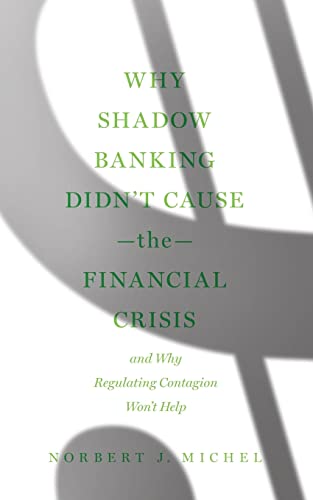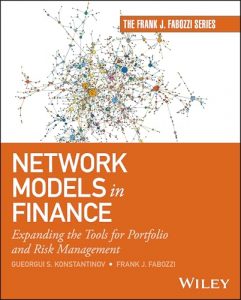1. Why Shadow Banking Didn’t Cause the Financial Crisis: And Why Regulating Contagion Won’t Help
This insightful book by Norbert J. Michel dissects the commonly held perceptions about shadow banking and its impact during the financial crisis. Michel argues that while shadow banking played a role, it wasn’t the primary cause of the crisis. He delves into the intricacies of financial contagion and critically examines the prevalent regulation strategies that are thought to mitigate its effects. This book is essential for anyone looking to understand the subtleties of financial stability and regulation. With a compelling argument and thorough research, it encourages readers to question established norms, making it a thought-provoking read.
2. Regulation of Bank Financial Service Activities: Cases and Materials
Authored by Lissa Broome and Jerry Markham, this book is a comprehensive guide that dives deep into the regulatory landscape surrounding banking activities. It presents a rich collection of cases and materials that illuminate the often complex relationship between regulatory frameworks and banking practices. Readers will benefit from the structured approach, as it not only provides theoretical knowledge but also practical insights from real-world scenarios. This book is perfect for students, practitioners, and anyone interested in the legal aspects of banking, making it a must-have for legal professionals in finance.
3. Research Handbook on Central Banking
Peter Conti-Brown and Rosa Maria Lastra have compiled an invaluable resource in the “Research Handbook on Central Banking.” This book is a treasure trove for those looking to understand the pivotal role of central banks in the economy. It covers a wide range of topics including monetary policy, regulatory authority, and the intersection of finance and law. The detailed case studies and analytical frameworks offered in this handbook make it an essential reference for professionals and academics alike. The investment in this rigorous examination of central banking is crucial for anyone interested in the future of monetary policy.
4. Fintech Regulation and Supervision Challenges within the Banking Industry
Felix I. Lessambo’s comparative study delves into the evolving landscape of fintech regulation and its implications for traditional banking systems. As technological advancements continue to revolutionize the financial sector, this book offers critical insights into the regulatory challenges that accompany fintech innovations. It explores case studies within the G-20 countries, highlighting best practices and potential pitfalls. This book is essential reading for regulators, bankers, and anyone interested in how fintech can coexist with traditional banking, making it a valuable addition to the discourse on financial transformation.
5. The Cambridge Handbook of Twin Peaks Financial Regulation
Andrew Godwin’s examination of the “Twin Peaks” model of financial regulation is a crucial read for understanding the dual objectives of safety and integrity within the financial system. The handbook comprehensively analyzes how this regulatory approach can lead to better protection for consumers while also fostering competition in the market. Aimed at policymakers and scholars, it balances complex regulatory theories with practical applications, making this an informative read that addresses contemporary challenges in financial oversight.
6. Cross-Conditionality Banking Regulation and Third-World Debt
This classic by Stephany Griffith-Jones and Ennio Rodriguez explores the implications of conditionality in banking regulations, particularly in the context of third-world debt crises. It scrutinizes how international financial institutions leverage conditionality and the effects these regulations have on developing economies. This insightful read not only contributes to the discourse on international finance but also encourages readers to consider the moral implications of regulatory frameworks in global economics. It’s an essential text for those passionate about equitable financial practices and the issues facing developing nations.
7. The Financial Courts
Jo Braithwaite’s “The Financial Courts” offers a crucial perspective on the legal systems that regulate financial markets. This book discusses the role of courts in enforcing financial regulations and ensuring market fairness. It presents an authoritative guide that is essential for legal practitioners, scholars, and investors who need a comprehensive understanding of the judiciary’s influence on financial market regulation. The topics are eloquently presented, making complex legal mechanisms accessible to a broader audience.
8. Financial Regulation: Law and Policy
This collaborative work by Michael S. Barr, Howell E. Jackson, and Margaret E. Tahyar showcases crucial regulatory frameworks impacting financial institutions. By examining the relationship between law and policy, the authors illustrate how legislative actions shape the regulatory landscape. It serves as a critical tool for understanding the impact of regulations on both national and global financial systems. The detailed analysis provides a comprehensive understanding that is indispensable for finance professionals and students alike.
9. Bank 4.0: Banking Everywhere, Never at a Bank
Brett King’s “Bank 4.0” is a groundbreaking work that discusses the future of banking in an increasingly digital age. King sheds light on how technology is reshaping the banking landscape, compelling readers to rethink traditional banking concepts. He explores the implications of banking services being available anywhere and highlights the challenges faced by conventional banks in adapting to this new model. This visionary perspective is essential reading for industry professionals eager to stay ahead of financial trends.
10. Smart Cities in Asia: Regulations, Problems, and Development
In this illuminating book, Thanh Phan and Daniela Damian explore the intersection of urban development and regulatory challenges in Asia. The authors discuss how proper regulation can enable better urban planning and help tackle emerging problems in rapidly developing cities. With a sharp focus on regulatory frameworks, this book is essential for urban planners, policymakers, and anyone interested in the future of urban spaces. It offers vital insights for driving sustainable development in increasingly complex urban environments.














































